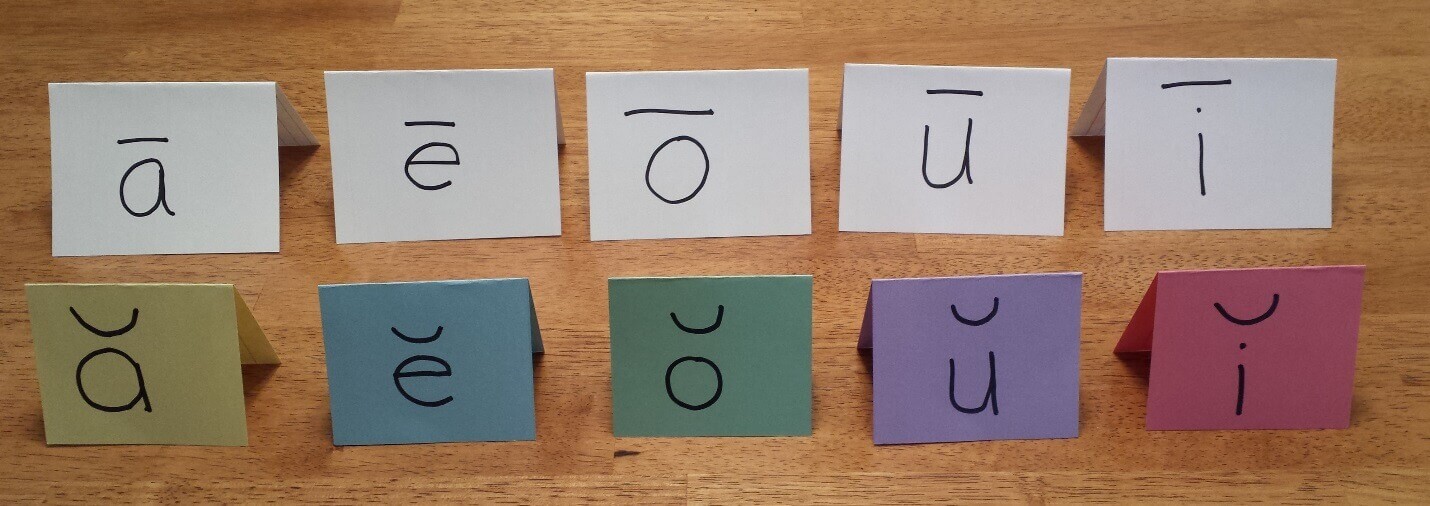Reading Activities: Mastering Vowel Sounds
 Over the decades, as a first grade and ESL teacher, I have sifted numerous reading strategies through the instructional sieve. I will share two, in particular, that
Over the decades, as a first grade and ESL teacher, I have sifted numerous reading strategies through the instructional sieve. I will share two, in particular, that
There are two critical activities to promote mastery of vowel sounds. I learned these at an Orton-Gillingham training ten years ago. These multisensory activities enable struggling readers and students with dyslexia to learn vowel sounds. (
Practicing Short Vowel Sounds
First, as each short vowel is introduced, teach a gesture with it.
- Short A-put your hand under your chin because when you say /ă/ your chin drops down to touch your hand; say “short a says /ă/”.
- E-make your pointer finger look like a toothbrush, hold your finger in front of your teeth and produce an /ĕ/ sound
; ; say “short e says /ĕ/”. - O-make your mouth in the shape of an o and point to the circle your mouth makes when you say “short o says /ŏ/”.
- U-put 2 hands together with thumbs pointing up to form
a u and say “short u says /ŭ/”. I-just like there is a dot on thei , dot your nose with your pointing finger, wrinkle your nose, and say “shorti says/ĭ/”.
Demonstrate and have students do these gestures daily when they say the short vowel sounds.
The gestures can be applied to segmenting words for accurate spelling. For example, after the teacher dictates the word sun, the student can say each sound in isolation /s/, /ŭ/, /n/. When they say /ŭ/ they should show the gesture. These multisensory activities cause students to master the vowel sounds.
Learn how students master vowel sounds with Reading Horizons explicit phonics method.
Vowel Tent Game
Critical activity number two is the Vowel Tent Game. (Academy of Orton-Gillingham Practitioners and Educators. (n.d.). Retrieved August 21, 2014, from http://www.ortonacademy.org/)
When a short vowel is introduced each student makes their own vowel tent by folding a colored 3 x 5-inch index card to form a tent. For example, when short a is introduced, all students will make a tent out of a yellow card and write ă on each side. They can put their initials on the back of the card. There

To play the game, students line up the vowel tents in front of them. The teacher says and gestures the vowel sound twice. The students hold up the correct card and say the name and sound of the vowel. The teacher can quickly assess who knows the vowel sound by the color of the card they hold up. Repeat this daily for a week or more. Then release responsibility to the students by asking a student to give one of the short vowel sounds. They invariably will give the name of the vowel away, also, but will learn to say only the sound with practice. Other students respond enthusiastically answering their classmates. Progress to asking who would like to give all the short vowel sounds to play the “Vowel Tent Game”. This activity also allows the teacher to assess not only who can recognize the vowel sound but who can produce the sounds. Generally, this activity, done over a six week period for about five minutes daily, promotes mastery of short vowel sounds.
After extensive practice and mastery of short vowel sounds, long vowel sounds are introduced. I extend the Vowel Tent Game by having students make ā, ē, ō, ū, ī vowel tent cards out of white 5 x 7-inch cards. Stand the corresponding white cards behind the colored cards and give the sound of any short or long vowel sound. At first, many inaccurate responses will be given. With practice, short and long vowels will be mastered in an engaging manner in a short amount of time.

Having the cards quickly and easily accessible allows the activity to be practiced daily. Students may keep the cards in their desk or in another personalized space for quick and easy access. Keep additional sets of vowel cards handy to replace lost cards.
Learn more strategies for teaching students to master the vowel sounds and other phonics-based skills with Reading Horizons elementary reading curriculum.
2 Comments

Karen Francis said
This will be so helpful to my struggling students. Most of them have problems remembering the vowel sounds especially the e and i. They tend to be comfused by these two.

Rodrigo said
I designed 5 vowel illustrations that could be a great complement for your post, in the case of Spanish-speaking ESL students :) (it is a free PDF, no subscription or anything required) -> http://rmacias.com/aeiou
The printable was made as a teaching-aid for Spanish-speaking kids, so they can learn and remember more easily how the vowels sound in English, since it uses funny Spanish expressions to stimulate their memory 🤓, and it includes ideas for DIY teaching games to make learning even more accessible to kids. I hope it helps somebody!